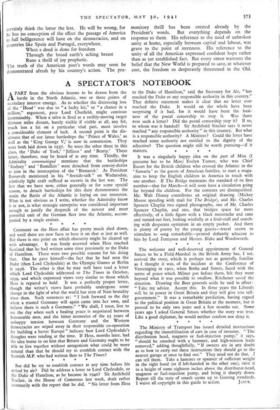A SPECTATOR'S NOTEBOOK
APART from the obvious lessons to be drawn from the battle in the North Atlantic, two or three points of secondary interest emerge. As to whether the distressing loss of the ' Hood' was due to " a lucky hit," or " a chance in a million," argument, pace Lord Chatfield, might continue interminably. When a salvo is fired at a swiftly-moving target thirteen miles distant, barely visible if visible at all, any hit, much less a hit on a particular vital part, must involve a considerable element of luck. A second point is the dis- closure that of our latest battleships the ' Prince of Wales,' as well as the ' King George V,' is now in commission. Tbey were both laid down in 1937. So were the other three in this class, the ' Duke of York,' Jellicoe ' and ' Beatty.' These latter, therefore, may be heard of at any time. Thirdly, the Admiralty communiqué mentions that the battleships ' Rodney ' and ' Ramillies ' were detached from convoy-duties to join in the interception of the ' Bismarck.' As President Roosevelt mentioned in his " fireside-talk " on Wednesday, relatively light craft sufficed as escorts in the last war. The fact that we have now, either generally or for some special reason, to detach battleships for this duty demonstrates the strain the Battle of the Atlantic is laying on our resources. What is not obvious as I write, whether the Admiralty know it or not, is what strategic enterprise was considered important enough to justify the despatch of the newest and most powerful unit of the German fleet into the Atlantic, accom- panied by a single cruiser. * * * *






























 Previous page
Previous page